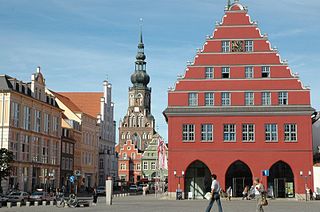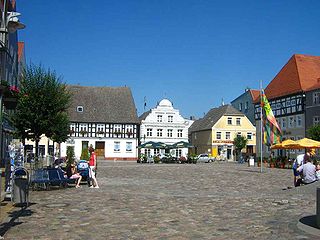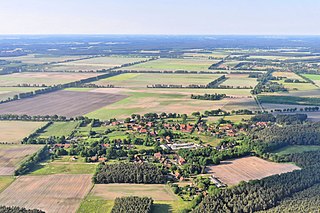
Pomerania is a historical region on the southern shore of the Baltic Sea in Central Europe, split between Poland and Germany. The central and eastern part belongs to the West Pomeranian, Pomeranian and Kuyavian-Pomeranian voivodeships of Poland, while the western part belongs to the German states of Mecklenburg-Western Pomerania and Brandenburg.

Greifswald, officially the University and Hanseatic City of Greifswald is the fourth-largest city in the German state of Mecklenburg-Western Pomerania after Rostock, Schwerin and Neubrandenburg. In 2021 it surpassed Stralsund for the first time, and became the largest city in the Pomeranian part of the state. It sits on the River Ryck, at its mouth into the Danish Wiek, a sub-bay of the Bay of Greifswald, which is itself a sub-bay of the Bay of Pomerania of the Baltic Sea.
Uckermark is a Kreis (district) in the northeastern part of Brandenburg, Germany. Neighbouring districts are Barnim and Oberhavel, the districts Mecklenburgische Seenplatte and Vorpommern-Greifswald in Mecklenburg-Vorpommern, and to the east Poland. It is one of the largest districts of Germany areawise. The district is named after the historical region of Uckermark.

Prenzlau is a town in Brandenburg, Germany, the administrative seat of Uckermark District. It is also the centre of the historic Uckermark region.

The history of Pomerania starts shortly before 1000 AD, with ongoing conquests by newly arrived Polan rulers. Before that, the area was recorded nearly 2000 years ago as Germania, and in modern times Pomerania has been split between Germany and Poland. Its name comes from the Old Polish po more, which means "(land) at the sea".

Gartz is a town in the Uckermark district in Brandenburg, Germany. It is located on the West bank of the Oder River, on the border with Poland, about 20 km south of Szczecin, Poland. It is located within the historic region of Western Pomerania.

Pasewalk is a town in the Vorpommern-Greifswald district, in the state of Mecklenburg-Vorpommern in Germany. Located on the Uecker river, it is the capital of the former Uecker-Randow district, and the seat of the Uecker-Randow-Tal Amt, of which it is not part.

Ueckermünde is a seaport town in northeast Germany, located in the district of Vorpommern-Greifswald, Western Pomerania, near Germany's border with Poland's Police County.

Penkun is a town in the Vorpommern-Greifswald district, and one of the smallest in Mecklenburg-Western Pomerania, Germany. It is situated 25 km east of Prenzlau, and 23 km southwest of Szczecin.

Strasburg (officially: Strasburg (Uckermark)) is a town in the Vorpommern-Greifswald district of Mecklenburg-Vorpommern in north-eastern Germany. It is situated in the historic Uckermark region, about 16 kilometres (9.9 miles) west of Pasewalk, and 33 kilometres (21 miles) east of Neubrandenburg.

Police County is a unit of territorial administration and local government (powiat) in West Pomeranian Voivodeship, north-western Poland, on the Polish-German border. It came into being on January 1, 1999, as a result of the Polish local government reforms passed in 1998. Its administrative seat and largest town is Police, which lies 13 kilometres (8 mi) north of the regional capital Szczecin. The only other town in the county is Nowe Warpno, lying 29 km (18 mi) north-west of Police.

The Margraviate of Brandenburg was a major principality of the Holy Roman Empire from 1157 to 1806 that played a pivotal role in the history of Germany and Central Europe.

The Uecker or Ucker is a river in the northeastern German states of Brandenburg, where it is known as the Ucker, and of Mecklenburg-Vorpommern. Its source lies in the Uckermark district, one kilometer north of Ringenwalde. It flows northward through several lakes. The first one is Großer Krinertsee. The next ones are rather small.

Casekow is a municipality in the Uckermark district, in Germany.

Groß Krams is a municipality in the Ludwigslust-Parchim district, in Mecklenburg-Vorpommern, Germany. It is part of the collective municipality of Hagenow-Land.

Krackow is a municipality in the Vorpommern-Greifswald district, in Mecklenburg-Vorpommern, Germany; 20km to the Polish city of Szczecin
The Uckermark is a historical region in northeastern Germany, which currently straddles the Uckermark District of Brandenburg and the Vorpommern-Greifswald District of Mecklenburg-Vorpommern. Its traditional capital is Prenzlau.

Randow is a river in the Uckermark region of Brandenburg and the Vorpommern region of Mecklenburg-Vorpommern, in part constituting these regions' border. An ancient name is Lochnitza, the town of Löcknitz derived its name from it. Since 1700, Randow is exclusively used.

Historical Western Pomerania, also called Cispomerania,Fore Pomerania, Front Pomerania or Hither Pomerania, is the western extremity of the historic region of Pomerania forming the southern coast of the Baltic Sea, located mostly in north-eastern Germany, with a small portion in north-western Poland.

Szczecin agglomeration or Stettin agglomeration is the urban agglomeration of the city of Szczecin and surrounding towns in the Polish-German border area.
























